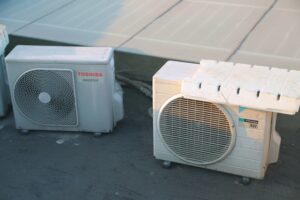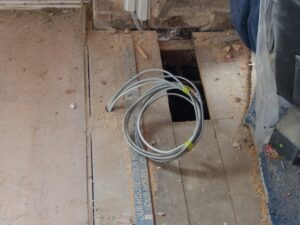Nobody likes dealing with a leaking water heater – it’s inconvenient, stressful, and can lead to some serious damage if not handled right away.
If you’ve noticed water pooling around your water heater, the first thing you should do is turn off the power to avoid any electrical hazards.
This simple step can save you from dangerous situations.
Now, take a deep breath and assess the situation.
The key is to act fast – identifying the source of the leak as soon as possible can save you both time and money, preventing further damage and avoiding bigger repairs down the road.
You might be wondering, “What could be causing the leak?“
Well, the culprits are often something simple like faulty valves, corrosion, or sediment buildup.
And if the problem seems a bit beyond your DIY comfort zone, don’t hesitate to call in the experts.
Trust me, it’s better to get help before the issue grows.
That’s where Excel Mechanical steps in.
With our expertise in HVAC and plumbing, we’re here to provide you with quick, reliable solutions tailored to your home or business needs. We’re all about getting your water heater back in action and making sure it’s working effectively and efficiently.
You can trust us to guide you through this process, so you can focus on the important things in your life.
Excel Mechanical isn’t just about fixing leaks—we’re your partner in making sure your home stays safe, comfortable, and functioning at its best.
In this blog, we’ll talk about:
- How to pinpoint the source of a leaking water heater and what to do about it.
- Immediate steps you can take to minimize water damage while waiting for a fix.
- When it’s time to call in the pros and why it’s worth it.
So, let’s get started!
Identifying the Source of the Leak
So, your water heater is leaking.
You’ve already turned off the power and water supply – great first step!
But now, the big question is: Where is the leak coming from?
Pinpointing the source quickly can save you from unnecessary repairs and help you figure out whether a simple fix is all that’s needed or if it’s time to call in the experts.
Let’s break it down – here are the most common culprits behind a leaking water heater:
Drain Valve Leaks
Ever noticed that little valve at the bottom of your water heater?
It’s called the drain valve, and it’s a common place where leaks can start.
If it’s not tightly closed or the valve is damaged, you might find water pooling around the base of the heater.
Quick Tip: Check for moisture around the valve. If you spot any, it might just need a good tightening with a wrench. Still leaking? It might be time to replace that valve. But don’t forget, always shut off the power and water first!
TPR Valve Leaks
The Temperature and Pressure Relief (TPR) valve is essential for safety.
Located on the top or side of your water heater, it prevents excessive pressure buildup.
Leaks from the TPR valve often indicate a problem with pressure or temperature within the tank.
Inspect the valve for drips or steady water flow, which could signal a malfunctioning component. If you identify a leak, replacing the TPR valve is generally a straightforward fix.
Keep in mind: Excessive temperature or pressure issues may require professional assessment.
Leaks from Inlet and Outlet Connections
The inlet and outlet pipe fittings connect the water heater to your home’s plumbing system.
Over time, these connections can corrode or become loose, leading to leaks.
Check for visible water around these connections.
If you see dampness or dripping, carefully tighten the fittings. If the leak persists, you may need to replace the affected connection or plumbing.
Action Point: Using plumber’s tape at connection points can help prevent leaks in the future.
Leaks from the Heater Tank
A leak from the water heater tank is often more serious and may indicate a need for replacement.
Inspect the exterior of the tank for signs of corrosion, rust, or water spots.
If you notice significant water accumulation under the tank, this may suggest internal corrosion, leading to leaks. While some minor leaks can be repaired, a severely damaged tank usually necessitates a full replacement.
Note: Take immediate action if you suspect a tank leak, as ignoring it can lead to more extensive damage or costly repairs.
Immediate Steps to Minimize Water Damage
A leaking water heater can be a real headache, especially when the water starts pooling around it.
It’s natural to feel a bit overwhelmed, but don’t worry – taking swift action can help you minimize the damage and prevent your home from being soaked.
So, what can you do right now?
Let’s break it down step-by-step.
Shutting Off the Power
Before addressing the leak, turn off the power supply to your water heater.
If you have an electric water heater, locate the circuit breaker dedicated to the unit. This step is vital to prevent electrical hazards, especially if water is pooling near electrical outlets.
If it’s a gas water heater, find the gas shutoff valve, usually located on the gas line connected to the heater.
Rotating this valve to the ‘off’ position stops gas flow.
Always exercise caution when handling power and gas to avoid accidents.
Closing the Water Supply
Immediately locate the water shut-off valve for your heater.
This valve is typically found on the cold water line coming into the tank.
Turning this valve clockwise will stop water from entering the heater, reducing the flow of water and minimizing damage.
In some cases, a whole-house water shut-off may be necessary, particularly if the leak is severe. Make sure to inform all household members about this temporary closure to avoid any confusion.
Without quick action here, you risk extensive water damage to your home.
Containing the Leak
To contain the leak effectively, consider using a bucket or container to catch any dripping water.
If possible, place towels or rags around the base to soak up minor leaks temporarily.
For more significant leaks, attaching a hose to the drain valve at the bottom of the heater may be necessary. Redirect the water to a nearby floor drain or outside. This helps manage water buildup until a professional can address the underlying issue.
Consulting Excel Mechanical for expert services can ensure that you receive the best solutions tailored to your needs.
Assessing Water Heater Damage and Repair Options
So, you’ve taken the initial steps to minimize the damage from your leaking water heater – great job!
But now what?
The next step is to assess the damage and figure out what needs to be done.
Should you repair it?
Or is it time for a replacement?
Let’s break it down.
Evaluating Corrosion and Rust
Corrosion and rust are common culprits when it comes to water heater leaks.
These issues typically start small, but if left unchecked, they can escalate and cause significant damage.
Start by inspecting the tank for any visible signs of rust or corrosion.
If you notice flaking or discoloration, it could be a red flag that your tank has been compromised.
Now, corrosion doesn’t just happen on the outside – it can also affect the pipes and fittings connected to the heater. If rust is present, the risk of leaks increases.
Is it repairable?
Sometimes, minor rust can be cleaned up with a protective coating.
But if the corrosion is significant, you might be looking at a full replacement.
Analyzing Sediment and Water Pressure Issues
Sediment accumulation is a common issue that can lead to leaks in your water heater.
If you haven’t flushed your tank regularly, sediment can build up, causing blockages and pressure issues.
Start by checking the drain valve at the bottom of the tank for any leaks.
If it’s leaking, it could be a simple fix, like replacing the valve, which typically costs between $10 and $30.
Next, assess your water pressure.
If the pressure is too high, it may put excess strain on the heater, leading to leaks. You can resolve this by installing a pressure-reducing valve.
For complex issues or sediment removal, contacting Excel Mechanical ensures you get professional advice and service tailored to both residential and commercial needs.
Long-Term Solutions and Preventative Measures
Now that we’ve assessed the damage and understood the core issues of your leaking water heater, it’s time to talk about long-term solutions.
We all know that it’s easier (and less expensive) to prevent problems than to deal with them once they’ve already caused significant damage.
So, let’s dive into some simple, yet powerful preventative measures that can extend the life of your water heater and save you money in the long run.
Regular Maintenance
Do you find yourself waiting until a problem occurs before fixing it?
Well, with water heaters, that approach could lead to expensive repairs and even replacements.
Regular maintenance is key to preventing issues before they escalate.
Here’s the good news: Regularly maintaining your water heater is as easy as setting a reminder once or twice a year to give it a check-up.
If you’re not sure what to look for, here’s a quick checklist:
- Flush the Tank Annually: Sediment buildup is a silent killer of water heater performance. By flushing the tank, you clear out mineral deposits that could affect efficiency and cause potential leaks.
- Inspect the Anode Rod: This rod protects your tank from corrosion. If it’s worn down, it’s time for a replacement. Doing this every couple of years can add years to your water heater’s life.
- Check the Pressure Relief Valve: This valve prevents excessive pressure from building up, which can cause a catastrophic failure. It’s easy to test, so don’t skip it!
By staying on top of these tasks, you’ll ensure your water heater keeps running smoothly for years to come.
Replacing Critical Components
Sometimes, repairs are more cost-effective than a full replacement. Instead of replacing your entire water heater, consider replacing faulty components.
Here’s an example: If you’re dealing with leaks at the top of the tank, the anode rod might be the culprit. Or, if the pressure relief valve is defective, replacing it can prevent overpressure issues and improve your system’s performance.
It’s a win-win.
Not only are you extending the life of your water heater, but you’re also avoiding the costly expense of a new unit.
Upgrading to a New Water Heater
At some point, all water heaters will need to be replaced.
If yours is nearing the end of its lifespan (typically 10-15 years), and you’re finding yourself dealing with frequent repairs, it might be time for an upgrade.
A new water heater could actually save you money in the long run by:
- Improving Energy Efficiency: Newer models are designed to operate more efficiently, which can significantly lower your energy bills.
- Reducing Repair Costs: A new unit comes with a warranty and fewer chances of breakdowns, so you won’t be shelling out for repairs.
- Providing More Consistent Hot Water: With a newer system, you won’t have to deal with inconsistent temperatures or running out of hot water mid-shower.
When to Contact a Professional Plumber
There are moments when DIY efforts just won’t cut it.
If you’ve tried addressing the leak yourself and the problem persists, or if the situation worsens, it’s time to call in a professional plumber.
Why risk further damage or even a bigger bill down the line when a quick fix from an expert could save you both time and money?
Signs It’s Time to Call in a Pro
If you’re experiencing any of these issues, it’s clear that a professional plumber should be on your speed dial:
- Persistent Leakage: If the leak continues, even after you’ve tried basic fixes, it could indicate a deeper issue, such as corrosion or a faulty internal component. Trying to patch it up yourself might only lead to more damage in the long run.
- Rust or Corrosion: Notice rust stains or does the tank appear to be corroding? This can be a sign that your water heater has experienced significant wear, and ignoring it could lead to a complete breakdown.
- No Hot Water: If you’re not getting hot water or it’s just lukewarm, it’s definitely time to get a professional’s opinion. It might be something as simple as a malfunctioning thermostat, but it could also point to a larger problem.
- Unusual Noises: Are you hearing banging or popping sounds coming from the heater? This is often due to sediment buildup in the tank, which requires a professional to clear out the debris and restore your heater’s efficiency.
- Odd Smells or Poor Water Quality: If you notice any strange smells—like rotten eggs or dirty laundry—coming from your hot water, it’s a sign that the system needs cleaning or even a replacement of certain parts.
A quick inspection and diagnosis from a professional can save you hundreds (or even thousands) in avoidable repairs and replacements.
Why Trust Excel Mechanical?
When it comes to water heater repairs and replacements, Excel Mechanical stands out for one simple reason: we are committed to delivering the best service possible. Here’s why you should reach out to us:
- Experience: With years of expertise, we’ve handled countless water heater issues. Whether it’s a simple repair or a complex installation, our team has the know-how to get it done right.
- Transparency: We provide upfront pricing with no hidden fees, so you’ll know exactly what to expect. No surprises—just solid, reliable service.
- Peace of Mind: We don’t just fix the problem; we ensure it doesn’t come back. Our high-quality work and attention to detail guarantee your system will run efficiently for years to come.
- Timely Service: We understand how crucial it is to have hot water, so we prioritize your needs. Whether it’s an emergency or a scheduled service, we show up on time and ready to work.
So, if your water heater is giving you trouble, don’t hesitate to contact us. We’ll quickly get to the root of the problem and fix it with the highest level of expertise and care.
Why DIY Might Not Be the Best Option?
Sure, it’s tempting to try and fix things yourself.
After all, who doesn’t want to save some cash?
But when it comes to water heaters, a DIY approach can often do more harm than good.
Here’s why:
- Risk of Further Damage: Water heaters involve complex systems, including gas lines and electrical components. Making a mistake can not only worsen the problem but also create more significant issues, like leaks or electrical hazards.
- Safety Concerns: Dealing with gas lines, electrical connections, or water pressure issues on your own can be dangerous. Improper handling can lead to safety risks, including fire hazards, carbon monoxide leaks, or even burst pipes.
- Lack of Proper Tools: Professionals have specialized tools that are designed to diagnose and fix the issue efficiently. Without the right equipment, you might struggle to even identify the problem, let alone fix it properly.
- Warranty Concerns: Attempting a DIY fix could void your water heater’s warranty. Manufacturers often require professional installation and repairs for warranty coverage to remain valid.
Don’t let the convenience of DIY tempt you into making a hasty decision. Call in the experts to make sure the job is done right the first time.




